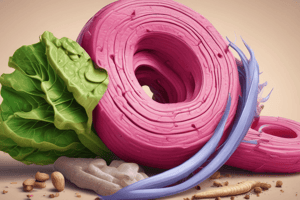Podcast
Questions and Answers
What are the two types of dietary fiber?
What are the two types of dietary fiber?
- Digestible and indigestible fiber
- Natural and synthetic fiber
- Soluble and insoluble fiber (correct)
- Simple and complex fiber
What do bulking fibers do as they move through the digestive system?
What do bulking fibers do as they move through the digestive system?
- Stimulate appetite
- Slow down digestion
- Increase acidity in the stomach
- Absorb water, easing defecation (correct)
Which component of dietary fiber can be attacked by bacteria in the intestine?
Which component of dietary fiber can be attacked by bacteria in the intestine?
- Insoluble polysaccharides (correct)
- Lignin
- Resistant starch
- Inulin
Which of the following is a non-starch polysaccharide found in dietary fiber?
Which of the following is a non-starch polysaccharide found in dietary fiber?
What is the physiological activity of soluble fiber in the colon?
What is the physiological activity of soluble fiber in the colon?
Which of the following is an example of soluble fiber?
Which of the following is an example of soluble fiber?
What is the physiological activity of insoluble fiber in the large intestine?
What is the physiological activity of insoluble fiber in the large intestine?
Which of the following is a metabolically inert component of dietary fiber?
Which of the following is a metabolically inert component of dietary fiber?
Which non-starch polysaccharide is a component of dietary fiber that can be attacked by bacteria in the intestine?
Which non-starch polysaccharide is a component of dietary fiber that can be attacked by bacteria in the intestine?
What is the main characteristic of bulking fibers as they move through the digestive system?
What is the main characteristic of bulking fibers as they move through the digestive system?
Flashcards are hidden until you start studying
Study Notes
Types of Dietary Fiber
- There are two types of dietary fiber: soluble fiber and insoluble fiber.
Physiological Activity of Fiber in the Digestive System
- Bulking fibers absorb water and expand as they move through the digestive system, helping to regulate bowel movements and prevent constipation.
- Soluble fiber is fermented by bacteria in the colon, producing short-chain fatty acids and promoting the growth of beneficial gut microbiota.
- Insoluble fiber absorbs water and helps to move food through the digestive system, promoting regular bowel movements.
Characteristics of Fiber Components
- Pectin is a non-starch polysaccharide found in dietary fiber.
- Soluble fiber is fermented by bacteria in the intestine, producing beneficial byproducts.
- Cellulose is a metabolically inert component of dietary fiber.
- Fructans are a type of non-starch polysaccharide that can be attacked by bacteria in the intestine.
Key Characteristics of Fiber Types
- Soluble fiber is characterized by its ability to be fermented by bacteria in the colon, promoting beneficial gut microbiota.
- Insoluble fiber is characterized by its ability to absorb water and promote regular bowel movements.
- Bulking fibers are characterized by their ability to absorb water and expand as they move through the digestive system.
Studying That Suits You
Use AI to generate personalized quizzes and flashcards to suit your learning preferences.





